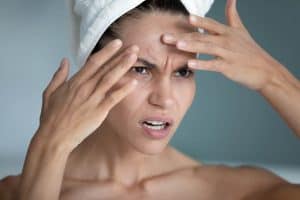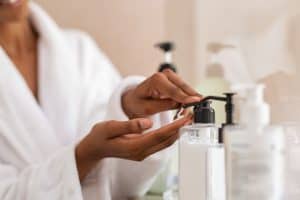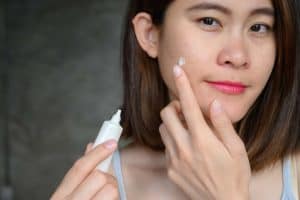Whether you’re new to having acne breakouts or have struggled with acne for a long time, caring for your acne-prone skin can be difficult and confusing. The silver lining is that with the right treatment, you can be on your way to clearer skin.
So what is causing your regular breakouts? And how can you clear up your face for good?

What Is Considered Acne-Prone Skin?
Acne-prone skin is when your skin is more likely to develop acne.
Frequent or persistent breakouts are usually a sign of acne-prone skin, and the severity of the breakouts and other symptoms such as oily skin, blackheads, and whiteheads may also point to acne-prone skin. Proper care and treatment are necessary to manage acne-prone skin and prevent breakouts.
What Are the Main Causes of Acne-Prone Skin?
Acne is a skin condition that is typically caused by the combination of excess oil (sebum), dead skin cells, and bacteria that clog hair follicles. This leads to inflammation and the formation of pimples, blackheads, and other types of skin lesions.
Hormonal changes, stress, genetics, and certain skincare products can all make your skin more acne-prone by increasing sebum production, altering the skin’s natural balance, or causing inflammation.
Hormones
Sudden changes in hormones can lead to hormonal acne. Hormonal changes can happen to anyone who is starting or stopping hormonal birth control or going through puberty, menstruation, pregnancy, or menopause.
Generally it’s an increase in Testosterone or other androgens that can increase sebum production, leading to clogged pores and acne.
Genetics
While there is no specific gene that directly causes acne, studies have shown that there is a hereditary component to acne-prone skin. This means that if you have family members who have struggled with acne, you may be more likely to develop it as well.
The activity levels of sebaceous glands are thought to play a role in this hereditary connection. Sebaceous glands produce oil, which can contribute to acne if there is an overproduction of it. Some families may have sebaceous glands that are more active than others, which can result in a tendency towards acne-prone skin that is passed down through generations.
Endocrine disorders
Endocrine conditions like PCOS (polycystic ovary syndrome) can make you more susceptible to acne breakouts.
PCOS disrupts your body’s ability to produce the right amounts of hormones. This hormonal imbalance leads to your skin producing too much oil, and this excess oil, combined with dead skin cells, results in acne.
Certain medications
Some medications or supplements can cause acne or make it worse. In particular, prescription medications like corticosteroids, lithium, thyroid hormones, and antiepileptic drugs (phenobarbital and hydantoin derivatives) can cause acne.
Too much Vitamin B12, too little Vitamin B2 or B6 can cause acne breakouts.
Stress
When you’re stressed, your adrenal glands release cortisol, prompting your skin to produce more oil that can clog your pores (and I think we know what happens next).
Skincare products with oil
Some skincare products contain oil or can irritate your skin. This excess oil and skin irritation creates the right conditions for acne to thrive. Choose non-comedogenic products because they contain ingredients that won’t clog pores. These are among the best products for acne-prone skin!
7 Ways to Prevent Breakouts in Acne-Prone Skin
Having acne-prone skin does not mean you’re doomed to experience constant breakouts. It does, however, mean that you need to take special care of your skin and pay attention to things that might irritate it.
Here are a few easy things you should do to properly care for your skin and prevent breakouts.
1. Wash your face twice a day
A poor skincare routine can do more harm than good in the fight against acne. It’s essential to wash your face at least once a day — but not more than twice — with a gentle cleanser. An unscented, mild cleanser helps remove the excess oil and dead skin cells that cause acne and may help your skin regain its pH balance.
There are also cleansers with medications in them formulated specifically for treating acne. Benzoyl peroxide and salicylic acid are great for treating and preventing future acne breakouts. Benzoyl peroxide and salicylic acid work by killing the bacteria that cause acne and can also help people with oily skin by removing excess oil and dead skin cells.
2. Avoid harsh exfoliants
Over-exfoliating your skin can cause acne. Irritation caused by some over-the-counter physical exfoliants (like scrubs) can inflame and irritate the skin’s surface. This inflammation could lead to acne.
If you notice that your skin is showing signs of acne after exfoliation, it might be time to switch it up. Look for products with chemical exfoliators (like salicylic acid) instead of physical exfoliators. These products are often less abrasive and also contain acne-fighting ingredients to help clean out pores.
Best Prescription Products for Acne-Prone Skin
If you have acne-prone skin, Pandia Health’s board-certified expert online doctors will evaluate your acne and prescribe the right treatment so you can clear up your acne.
3. Use non-comedogenic skincare products
If you have acne-prone skin, look for products labeled “non-comedogenic.” These products contain ingredients that are less likely to clog pores.
Incorporating these products into your skincare regimen will help you avoid further skin irritation.
4. Evaluate your hair care routine
Oil from your hair can build up in your pores and follicles and cause acne. Doctors recommend shampooing regularly and keeping hair out of your face if you have oily hair.
Just as skincare and makeup products contain oils that can cause acne, so do hair products. So it’s also important to look for products labeled as “non-comedogenic” for your hair too.
5. Stay hydrated and moisturized
Dry skin can trigger your skin’s oil glands to produce too much oil, which can contribute to acne. Increasing your water intake can help keep your skin hydrated.
However, this is not enough on its own to prevent breakouts. You should use a non-comedogenic moisturizer to keep your skin’s oil production down.
6. Regularly change your sheets and pillowcases
If you go too long in between washing your sheets, you’re creating an environment for acne-causing bacteria to thrive. As you know, bacteria + dead skin cells + excess oil = irritants for your skin that can cause acne.
With acne-prone skin, it’s important to look for laundry detergents that are fragrance-free. The term “fragrance” in laundry soaps can include tons of harsh ingredients that leave residues on fabrics. When those fabrics rub against your skin, they can cause irritation, inflammation, and oily skin from excess oil production — which leads to acne.
7. Avoid picking and popping
This is hard because for some people it is so satisfying… but please don’t pick or pop your pimples! Doing so can further irritate your skin and most pimples will clear up on their own when a consistent skincare routine is followed.
According to the American Academy of Dermatology (AAD), touching your face can spread dirt, oil, and bacteria from your hands to your face. This can create new acne breakouts or worsen existing ones. The AAD recommends only touching your face when cleaning or applying lotion, sunscreen, or makeup (and with clean hands!).
The Best Products for Acne-Prone Skin
Below are some of the best products for acne-prone skin available only with a prescription.
1. Tretinoin
Tretinoin cream is a prescription-strength topical retinoid used to treat acne. It works better than salicylic acid and benzoyl peroxide (two common ingredients found in over-the-counter acne treatments).
Tretinoin works by decreasing your skin’s oil production and the size of your pores, making the skin less oily, the pores smaller, and the cells less sticky, reducing the likelihood that your pores will get clogged. It decreases the severity and number of acne lesions and speeds up the time to heal pimples.
Buy Tretinoin Cream Online with Free Delivery
Get your prescription online with a consult from our expert doctors, and we will deliver it right to your mailbox with free delivery.
2. Topical/Oral antibiotics
Antibiotics for acne come in two forms: topical and oral. These medications work by killing excess bacteria on your skin and reducing redness and inflammation caused by acne pimples. They should ideally be used with benzoyl peroxide to reduce the likelihood of developing antibiotic resistance.
3. Oral contraceptives
Did you know that birth control pills can also be used to treat acne? Yes, that’s right. You can treat acne AND prevent pregnancy, as well as other benefits. Talk to your doctor or the expert board-certified doctors at Pandia Health about your options.
FYI: Combining oral birth control and oral antibiotics can cause your birth control not to work as well. So be sure to use a backup birth control method if needed.
4. Anti-androgen medication
Anti-androgen medication, like Spironolactone, can be used to treat acne. It works by blocking androgen receptors in the body and stopping the way skin cells respond to these hormones. Studies show that Spironolactone can reduce acne by 50%–100%!
5. Other topical retinoids
Like Tretinoin, retinoids like Differin and Adapalene gels are prescription medications that prevent hair follicles from becoming clogged, preventing pimples from forming. There is both over the counter strength (0.1%) and prescription only strength (0.3% = 3x as strong) differin.
Takeaways
Living with acne and taking care of your acne-prone skin is no easy feat. If you’re struggling and need some help, Pandia Health now offers online acne treatment. Pandia Health is bringing the doctor’s office to you with telehealth services, so you can get prescription acne treatment (and birth control!) delivered to you. Skip the trip to the doctor’s office and the pharmacy lines with our FREE delivery service!
Pandia Health is committed to providing accurate and reliable health knowledge. Check out our Instagram, YouTube, and blog for more information about acne treatments, women’s health, and lifestyle habits.
Disclaimer: This article is for general informational purposes only and is NOT a substitute for professional medical advice. Always seek the advice of your healthcare provider before starting or changing acne treatment.




